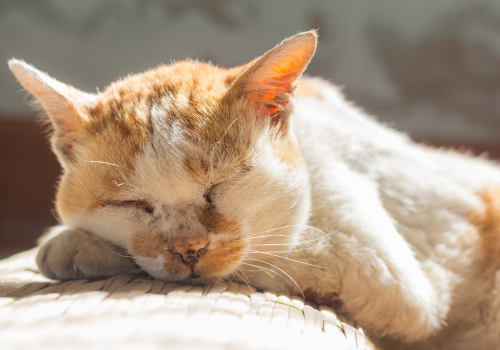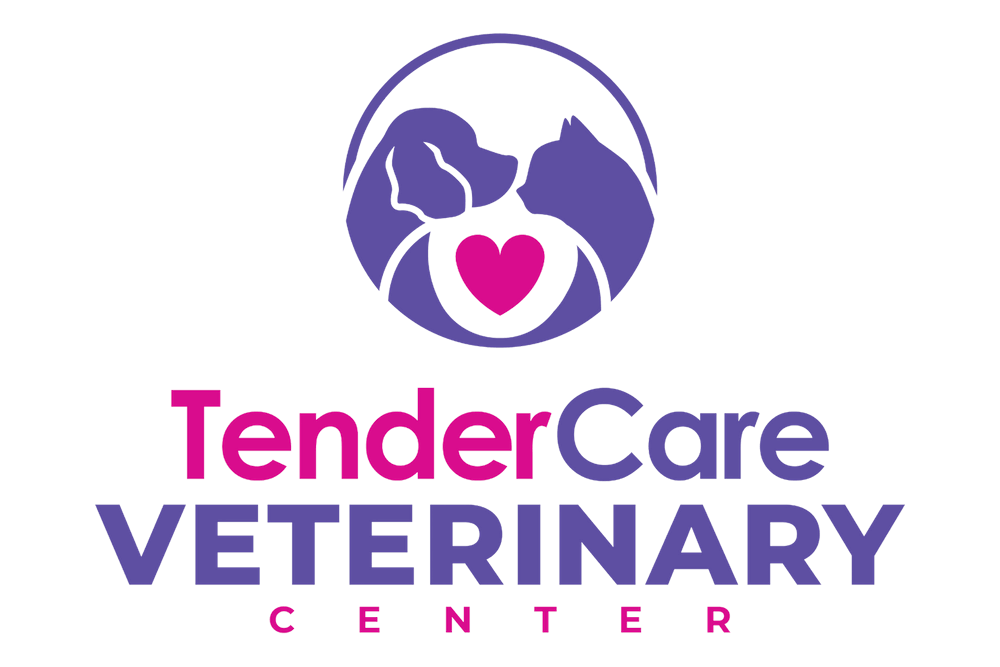If you’ve noticed that your cat is slowing down in their senior years, you’re probably a bit concerned, as any loving pet parent would be. As veterinarians, though, we maintain that aging in and of itself isn’t a disease, so you want to err on the side of caution if you’ve noticed any physical or mental changes in your senior cat. That’s likely why you’ve turned to the internet. To prevent the misinformation you can find online from (albeit well-meaning) keyboard warriors, the veterinarians here at Tender Care Veterinary Center answered FAQs on senior cat care and shared those facts with you below.
While the information below is accurate, it’s always best to talk to your own veterinarian about any questions you may have on how to best care for your aging cat. If your cat needs a veterinarian in or near Fishersville, VA, we’d be thrilled to help ensure that the changes you’ve seen are part of the natural aging process and not the beginnings of an illness. Give us a call at (540) 943-9080 today to schedule their first appointment.
How will getting older impact the health of my cat?
Some conditions, syndromes, and diseases can develop as a cat ages.
The diseases we most often see in senior cats are:
- Kidney Disease
- Liver Disease
- Diabetes
- Arthritis
- Cancer
Cats can also develop an overactive thyroid gland as they get older, which we diagnose with routine blood work. It’s also good to keep in mind that the wear and tear issues a cat can experience as they get older, such as arthritis, often lead to things like mobility, grooming, and possibly litter box issues.
How do a cat's nutritional needs change as they age?
Again, age is not a disease. A senior cat’s nutrition comes down to their health and lifestyle, and then we make choices based on that. So if your cat's showing signs of early diabetes or kidney disease, we might elect to change them to a diet consistent with those diseases’ needs. Or, if we have a cat with grooming issues, we might switch to a hairball diet to support that.
Often, senior cats need a little bit more fat in their diet, especially if they need to help maintain weight as they get older. Many cat food companies are putting things like Omega-3s into senior cat foods and glucosamine and chondroitin to help with joint support management. We don’t necessarily think all cats need to switch to senior cat food. Still, some nutritional requirements may call for that or even a prescription diet if your cat develops something like diabetes or renal disease.
What are some signs and symptoms that your cat may be slowing down?
Signs of slowing down are individual to the cat. Some cats remain extremely active into their senior years, while others are total couch potatoes, just like the rest of us. And so things that can indicate slowing down are if, all of a sudden, our interactions with our cat change. For example, if you have a cat that’s usually a lap cat but they're spending more time by themselves, that could indicate something is going on. Outdoor cats may not want to go outside as much. You may notice them hesitating to jump on a counter or a table to look for stuff and investigate.
Cats love to sleep, and that’s a fairly universal thing, but an aging cat will often sleep quite a bit more—especially compared to a kitten.
You may also see more subtle things like inadequate grooming. As cats age, if they start to feel stiffer and have arthritis that hurts, or maybe they're feeling ill from another underlying condition, they're not too worried about cleaning themselves. So you will start to have matting or clumping of the fur where it's kind of oily.
Weight loss can be another subtle thing that you'll see, where all of a sudden, you might have this nice full cat, not excessively full hopefully, but now you start to see the ribs or spine. Some cats eat less as they get older, although some cats eat a ton more, so appetite is unique to each cat.
Again, it's tricky to answer all possibilities in one question, but it's often those subtle things that you need to be looking for as your cat ages to give you the ability to detect if something is wrong early on. But we'd rather know about any behavioral changes or any other concerns you have as your cat gets older, or really at any age, so we can figure out what's going on sooner rather than later.

What are some health complications or diseases commonly experienced by senior cats?
We see kidney disease as the most significant one beyond arthritis and mobility issues. We can see kidney disease at any age, but the onset is typically in the senior years.
The typical ways kidney disease manifests are:
- Weight loss
- Vomiting
- An increase in urine output due to the cat drinking more
But we also see issues with the thyroid gland in which it becomes overactive, which manifests as a ravenous appetite. Sometimes they'll start acting almost hyperactive, and we could see vomiting and weight loss. So kidney disease and thyroid issues are the two biggest things we watch for in senior cats, although arthritis is common with any elderly pet. And we may see something like trouble getting around, issues jumping, and other mobility problems stemming from this arthritis. Unfortunately, there is also the possibility that your senior cat may get diabetes or cancer. We can treat these with much more success when you catch them early, so remember to see your veterinarian if you have any concerns about behavior changes in your senior cat.
What kinds of preventive care can help extend the life and health of my cat?
Preventive care is a multi-pronged thing. You can do many things at home to keep your cat healthy, including ensuring they don't have to work too hard to get to their litter box or food and water. If your cat has always had to go downstairs to use the litter box, we may need to consider moving a litter box or adding a litter box to the main floor or whichever floor they spend the most time on. The same goes for food—if they usually eat on a counter, we may either need to help them up to the counter or consider putting their food on the floor.
Another thing to keep in mind is senior cats still need to be stimulated. Exercise and enrichment remain essential, so we need to keep their brains active. Just as in people, the more we use it, the less we lose it.
Also, it’s critical to feed your cat a high-quality diet and perhaps a prescription diet if your veterinarian has expressed that this would help with an existing condition.
And then, on the veterinary end of things, it's our job to help you monitor and detect diseases early, especially in senior cats. We will do that by doing more frequent exams, so we like to see them every six months as they get older. But we also may recommend yearly blood work as they get older to start screening for things like kidney or thyroid disease before they become an issue. And then we keep up with age-appropriate and lifestyle-appropriate vaccines as well.
Another big part is taking care of senior cats’ teeth. As cats age, we get more aggressive with their dental management. So it might mean that they need to come in every year, or every couple of years, to have their teeth cleaned by us to avoid painful dental disease.
And then the last thing is going to be joint management and joint care because of arthritis, and we want to make sure we're keeping them as comfortable as possible. Many veterinarians will give something like Chondroprotec to help manage your cat’s arthritis and help keep their joints nice and healthy.
Why are regular wellness exams so important for senior cats?
Wellness exams for senior cats are critical because we can catch something early before the cat shows you any clinical signs. The chances of successfully treating a cat in something like early renal failure are much better. Or perhaps their lab work shows that their SDMA, one of the earliest, most sensitive indicators of kidney function, is elevated. There will almost certainly have been no indication that your cat is in early renal failure. Still, now we’ve caught it and can hopefully get your cat on the road to recovery by doing things like increasing water intake.
Now consider a cat that didn’t get that wellness exam and, thus, that lab work. Fast forward six or eight months to a year, and now their cat is vomiting, dehydrated, and doesn't want to eat. We get them in, pull blood work, and now every kidney marker — BUN, creatinine, phosphorus, SDMA — is elevated, and sometimes those numbers are through the proverbial roof. It’s much more challenging to bring them back from that point. You can try IV fluids, diets, and supplements, but you might not ever get your cat back to a normal, happy quality of life. But if we had caught it much earlier, the potential outcome would have been entirely different.
What is the most important thing to know about caring for a senior cat?
The most important thing to remember is that you're their best advocate, and you know them best. Cats can be challenging to diagnose at times because they're secretive creatures. And so the better you know them as their pet parent, the more you’ll know when something's off. As veterinarians, we are trained on what to look for, but having that intimate knowledge of your cat's personality and normal activities makes a huge difference. So if you notice any changes in their interactions, routines, appetites, or litter box habits, we want to see them.
Senior cats are also going to require a little bit more care. Not only will you need to bring them in for wellness exams and dental care more often than when they were adult cats, but they’ll also need things like steps or assistance if you keep their food or water elevated. Sometimes you have to adjust their litter boxes if they have trouble stepping into a higher-walled litter box.
If you have additional questions about senior cat care, we are here to help! As your dog’s veterinarian in Fishersville, VA, we would be happy to discuss ways to keep your faithful feline in good health as they progress into their senior years. Call us at (540) 943-9080 , or drop us an email at [email protected] today.
